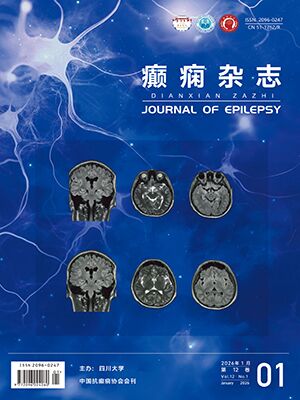| 1. |
Löscher W. Epilepsy and alterations of the blood-brain barrier: cause or consequence of epileptic seizures or both? Handb Exp Pharmacol, 2022, 273: 331-350.
|
| 2. |
Dinarello CA. Overview of the IL-1 family in innate inflammation and acquired immunity. Immunol Rev, 2018, 281(1): 8-27.
|
| 3. |
Kostic D, Carlson R, Henke D, et al. Evaluation of IL-1β levels in epilepsy and traumatic brain injury in dogs. BMC Neurosci, 2019, 20(1): 29.
|
| 4. |
Cristina E, Leandro é, Boni B, et al. NLRP3 and NLRP1 inflammasomes are up-regulated in patients with mesial temporal lobe epilepsy and may contribute to overexpression of caspase-1 and IL-β in sclerotic hippocampi. Brain Res, 2021, 1752: 147230.
|
| 5. |
Terrone G, Balosso S, Pauletti A, et al. Inflammation and reactive oxygen species as disease modifiers in epilepsy. Neuropharmacology, 2020, 167: 107742.
|
| 6. |
Barseem NF, Khattab ESAEH, Mahasab MM. IL-1β-31/IL1-RA genetic markers association with idiopathic generalized epilepsy and treatment response in a cohort of Egyptian population. Int J Neurosci, 2020, 130(4): 348-354.
|
| 7. |
van Vliet EA, Aronica E, Vezzani A, et al. Neuroinflammatory pathways as treatment targets and biomarker candidates in epilepsy: emerging evidence from preclinical and clinical studies. Neuropathol Appl Neurobiol, 2018, 44(1): 91-111.
|
| 8. |
Xiao Z, Peng J, Wu L, et al. The effect of IL-1β on synaptophysin expression and electrophysiology of hippocampal neurons through the PI3K/Akt/mTOR signaling pathway in a rat model of mesial temporal lobe epilepsy. Neurol Res, 2017, 39(7): 640-648.
|
| 9. |
Kamaşak T, Dilber B, Yaman SÖ, et al. HMGB-1, TLR4, IL-1R1, TNF-α, and IL-1β: novel epilepsy markers? Epileptic Disord, 2020, 22(2): 183-193.
|
| 10. |
Choi J, Kim SY, Kim H, et al. Serum α-synuclein and IL-1β are increased and correlated with measures of disease severity in children with epilepsy: potential prognostic biomarkers? BMC Neurol, 2020, 20(1): 85.
|
| 11. |
Dilena R, Mauri E, Aronica E, et al. Therapeutic effect of Anakinra in the relapsing chronic phase of febrile infection-related epilepsy syndrome. Epilepsia Open, 2019, 4(2): 344-350.
|
| 12. |
Noe FM, Polascheck N, Frigerio F, et al. Pharmacological blockade of IL-1β/IL-1 receptor type 1 axis during epileptogenesis provides neuroprotection in two rat models of temporal lobe epilepsy. Neurobiol Dis, 2013, 59: 183-93.
|
| 13. |
Soltani Khaboushan A, Yazdanpanah N, Rezaei N. Neuroinflammation and proinflammatory cytokines in epileptogenesis. Mol Neurobiol, 2022, 59(3): 1724-1743.
|
| 14. |
?utulovi? N, Gruba? ?, ?uvakov S, et al. Chronic prostatitis/chronic pelvic pain syndrome increases susceptibility to seizures in rats and alters brain levels of IL-1β and IL-6. Epilepsy Res, 2019, 153: 19-27.
|
| 15. |
Numis AL, Foster-Barber A, Deng X, et al. Early changes in pro-inflammatory cytokine levels in neonates with encephalopathy are associated with remote epilepsy. Pediatr Res, 2019, 86(5): 616-621.
|
| 16. |
Tao H, Gong Y, Yu Q, et al. Elevated serum matrix metalloproteinase-9, interleukin-6, hypersensitive c-reactive protein, and homocysteine levels in patients with epilepsy. J Interferon Cytokine Res, 2020, 40(3): 152-158.
|
| 17. |
Lorigados Pedre L, Morales Chacón LM, Pavón Fuentes N, et al. Follow-up of peripheral IL-1β and IL-6 and relation with apoptotic death in drug-resistant temporal lobe epilepsy patients submitted to surgery. Behav Sci (Basel), 2018, 8(2): 21.
|
| 18. |
Cantarín-Extremera V, Jiménez-Legido M, Duat-Rodríguez A, et al. Tocilizumab in pediatric refractory status epilepticus and acute epilepsy: Experience in two patients. J Neuroimmunol, 2020, 340: 577142.
|
| 19. |
Stredny CM, Case S, Sansevere AJ, et al. Interleukin-6 blockade with tocilizumab in anakinra-refractory febrile infection-related epilepsy syndrome (FIRES). Child Neurol Open, 2020, 7: 2329048X20979253.
|
| 20. |
Leo A, Nesci V, Tallarico M, et al. IL-6 Receptor blockade by tocilizumab has anti-absence and anti-epileptogenic effects in the wag/rij rat model of absence epilepsy. Neurotherapeutics, 2020, 17(4): 2004-2014.
|
| 21. |
West PK, Viengkhou B, Campbell IL, et al. Microglia responses to interleukin-6 and type I interferons in neuroinflammatory disease. Glia, 2019, 67(10): 1821-1841.
|
| 22. |
Gough P, Myles IA. Tumor necrosis factor receptors: pleiotropic signaling complexes and their differential effects. Front Immunol, 2020, 11: 585880.
|
| 23. |
Michev A, Orsini A, Santi V, et al. An overview of the role of tumor necrosis factor-alpha in epileptogenesis and its terapeutic implications. Acta Biomed, 2022, 92(S4): e2021418.
|
| 24. |
Kothur K, Bandodkar S, Wienholt L, et al. Etiology is the key determinant of neuroinflammation in epilepsy: elevation of cerebrospinal fluid cytokines and chemokines in febrile infection-related epilepsy syndrome and febrile status epilepticus. Epilepsia, 2019, 60(8): 1678-1688.
|
| 25. |
Casta?eda-Cabral JL, Ure?a-Guerrero ME, Beas-Zárate C, et al. Increased expression of proinflammatory cytokines and iNOS in the neocortical microvasculature of patients with temporal lobe epilepsy. Immunol Res, 2020, 68(3): 169-176.
|
| 26. |
Shi Y, Zhang L, Teng J, et al. HMGB1 mediates microglia activation via the TLR4/NF-κB pathway in coriaria lactone induced epilepsy. Mol Med Rep, 2018, 17(4): 5125-5131.
|
| 27. |
Gao F, Gao Y, Zhang SJ, et al. Alteration of plasma cytokines in patients with active epilepsy. Acta Neurol Scand, 2017, 135(6): 663-669.
|
| 28. |
Kamali AN, Zian Z, Bautista JM, et al. The potential role of pro-inflammatory and anti-inflammatory cytokines in epilepsy pathogenesis. Endocr Metab Immune Disord Drug Targets, 2021, 21(10): 1760-1774.
|
| 29. |
Arulsamy A, Shaikh MF. Tumor necrosis factor-α, the pathological key to post-traumatic epilepsy: a comprehensive systematic review. ACS Chem Neurosci, 2020, 11(13): 1900-1908.
|
| 30. |
Derynck R, Budi EH. Specificity, versatility, and control of TGF-β family signaling. Sci Signal, 2019, 12(570): eaav5183.
|
| 31. |
Tzavlaki K, Moustakas A. TGF-β signaling. Biomolecules, 2020, 10(3): 487.
|
| 32. |
Heldin CH, Moustakas A. Signaling receptors for TGF-β family members. Cold Spring Harb Perspect Biol, 2016, 8(8): a022053.
|
| 33. |
Kim SY, Senatorov VV Jr, Morrissey CS, et al. TGFβ signaling is associated with changes in inflammatory gene expression and perineuronal net degradation around inhibitory neurons following various neurological insults. Sci Rep, 2017, 7(1): 7711.
|
| 34. |
Vezzani A, Balosso S, Ravizza T. Neuroinflammatory pathways as treatment targets and biomarkers in epilepsy. Nat Rev Neurol, 2019, 15(8): 459-472.
|
| 35. |
Luo J. TGF-β as a key modulator of astrocyte reactivity: disease relevance and therapeutic implications. Biomedicines, 2022, 10(5): 1206.
|
| 36. |
Hong S, JianCheng H, JiaWen W, et al. Losartan inhibits development of spontaneous recurrent seizures by preventing astrocyte activation and attenuating blood-brain barrier permeability following pilocarpine-induced status epilepticus. Brain Res Bull, 2019, 149: 251-259.
|
| 37. |
Reyes-Garcia SZ, Scorza CA, Ortiz-Villatoro NN, et al. Losartan fails to suppress epileptiform activity in brain slices from resected tissues of patients with drug resistant epilepsy. J Neurol Sci, 2019, 397: 169-171.
|
| 38. |
Hanael E, Chai O, Konstanitin L, et al. Telmisartan as an add-on treatment for dogs with refractory idiopathic epilepsy: a nonrandomized, uncontrolled, open-label clinical trial. J Am Vet Med Assoc, 2022, 260(7): 735-740.
|




